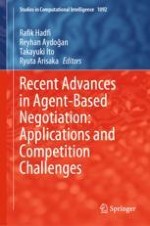This book comprises carefully selected and reviewed outcomes of the 13th International Workshop on Automated Negotiations (ACAN) held in Vienna, 2022, in conjunction with International Joint Conference on Artificial Intelligence (IJCAI) 2022. It focuses on the applications and challenges of agent-based negotiation including agreement technology, mechanism design, electronic commerce, recommender systems, supply chain management, social choice theory, and others.
This book is intended for the academic and industrial researchers of various communities of autonomous agents and multi-agent systems, as well as graduate students studying in those areas or having interest in them.
